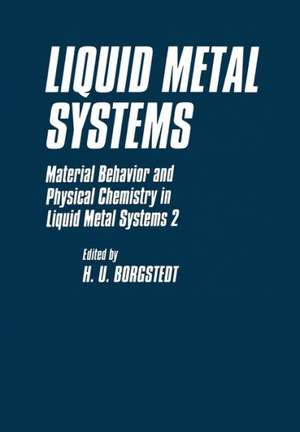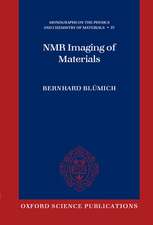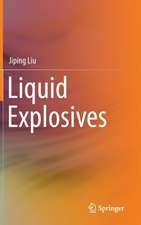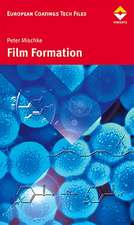Liquid Metal Systems: Material Behavior and Physical Chemistry in Liquid Metal Systems 2
Editat de H. U. Borgstedten Limba Engleză Paperback – 21 oct 2012
Preț: 399.88 lei
Nou
Puncte Express: 600
Preț estimativ în valută:
76.52€ • 80.09$ • 63.69£
76.52€ • 80.09$ • 63.69£
Carte tipărită la comandă
Livrare economică 31 martie-14 aprilie
Preluare comenzi: 021 569.72.76
Specificații
ISBN-13: 9781461358145
ISBN-10: 1461358140
Pagini: 436
Ilustrații: XI, 419 p.
Dimensiuni: 170 x 244 x 23 mm
Greutate: 0.69 kg
Ediția:Softcover reprint of the original 1st ed. 1995
Editura: Springer Us
Colecția Springer
Locul publicării:New York, NY, United States
ISBN-10: 1461358140
Pagini: 436
Ilustrații: XI, 419 p.
Dimensiuni: 170 x 244 x 23 mm
Greutate: 0.69 kg
Ediția:Softcover reprint of the original 1st ed. 1995
Editura: Springer Us
Colecția Springer
Locul publicării:New York, NY, United States
Public țintă
ResearchCuprins
1. Activity Transport in Liquid Metal Systems.- Transport of Radioactive Material in Liquid Sodium.- Transport of Radioactive Corrosion Products in Primary Systems of a Sodium Cooled Fast Reactor.- Transport Phenomena of Iodine and Noble Gas Mixed Bubbles through Liquid Sodium.- Activation, Corrosion and Contamination in Fast Breeder Reactors: Validation of Models with Experimental Data.- Radioactive Sodium Chemistry Loop for Activity Transport Studies and Meter Testing.- 2. Corrosion by Liquid Metals.- Post-Corrosion and Metallurgical Analyses of Sodium Piping Materials Operated for 100,000 Hours.- Corrosion Behaviour of Stainless Steel and Its Weld in High Temperature Sodium under Tensile Stress.- Corrosion Behaviour of Nb-Based and Mo-Based Alloys in Liquid Na.- Sodium Compatibility of Ceramics.- Compatibility Tests of Insulating Materials in Pb-17Li Alloy.- Deposition of the Corrosion Products in Pb- 17Li.- An Investigation of Chromium and Nickel Mass Transfer in Non-Isothermal Sodium Loop.- 3. Influence of Liquid Metals on the Mechanical Properties of Materials.- Variation in the Tensile Properties of AISI 316 Stainless Steel on Exposure to High Carbon Dynamic Sodium at 723 K.- Results of Material Testing in the “CREVONA” and “FARINA” Loops.- Comparison of Creep Rupture Properties of Type 316L(N) Steel in Air and Flowing Sodium.- High-Cycle Fatigue Behaviour of Alloy 718 in Liquid Sodium.- 4. Purification of Liquid Metals and the Purity Measurement.- Sodium for Fast Breeders — Production, Purification, and Quality.- Experimental Investigation of an Automatic Plugging Meter for Measuring Impurities in Sodium.- High Purity Alkali Metal (Sodium) as Chemical- Thermal Medium.- An Electrochemical Hydrogen Meter for Use in Sodium — Basic Studies andOperational Experience.- Monitoring the Composition of Liquid Pb-17Li: A State-of-the-Art Appraisal.- Dissolution of Sodium Oxide in Liquid Sodium: A New Kinetics in a Large Temperature Range.- Development of a New Plugging Indicator and Experimental Tests in a Lithium Lead Facility.- Oxidation of Zirconium — Titanium Alloys in Liquid Sodium: Validation of a Hot Trap, Determination of the Kinetics.- Hydrogen Removal from NaK with Mesh-Packed and Meshless Cold Traps.- 5. Chemical Reactions in Liquid Metals.- Standard Gibbs Energy of Formation of K3NbO4 and K3TaO4 and Threshold Oxygen Levels for their Formation in Potassium, Niobium and Tantalum.- Caesium and Its Mixtures: Their Chemical Reactions with Alloys of Transition Metals Used to Clad Reactor Fuels.- Reactions of Liquid Caesium with the Oxides of Uranium.- Thermochemistry of Na-Fe-O System and Its Relevance to Corrosion of Steels in Sodium.- Some Aspects of Carbon Bearing Species Behaviour in a System Sodium- Steels-Protective Gas-Mineral Oil.- Physical Chemistry of Sodium-Caesium-Graphite Systems.- 6. Physical Chemistry of Solutions in Liquid Metals.- Solubility of Metals in the Liquid Alkali Metals: The Solubility Data Programme of the IUPAC.- Application of Solution Models for the Prediction of Corrosion Phenomena in Liquid Metals.- Solubility of Zirconium in Liquid Sodium.- Solubility Measurement of Sodium Iodide in Sodium-Stainless Steel Systems.- Solutions of Nitrogen in Liquid Lithium Containing Dissolved Alkaline Earth Metals: Solubilities, Precipitating Species and Phase Relationships.- Physical-Chemical Principles of Lead-Bismuth Coolant Technology.- Diffusion Coefficients of Metals in Liquid Metals at High Dilution.- Behaviour of Lithium in the Pb- 17Li System.- 7. Experiments in Relation to NewApplications of Liquid Metals.- Electrochemical Studies in the Na-Hg System.- Behaviour of Beta-Alumina Solid electrolytes in an AMTEC Environment.- Experience in Operating Heavy Liquid Metal MHD Two-Phase Flow Systems.- 8. Technical Experiments with Liquid Metals.- Large Scale FAUNA Experiments on the Interaction of Sodium, Concrete and Steel.- NACOWA Experiments on Release and Transfer of Cesium, Zinc and Iodine from a Sodium Pool under EFR Conditions.- The Disassembly and Safe Disposal of Alkali Metal Systems.














